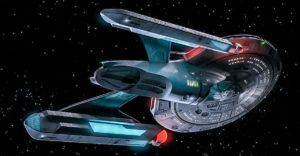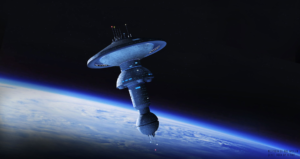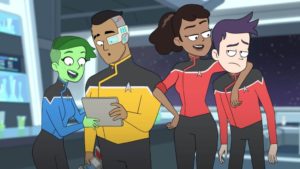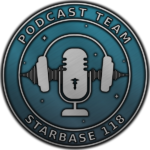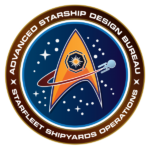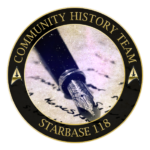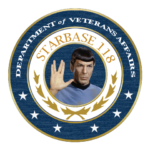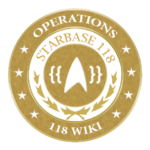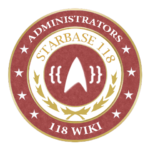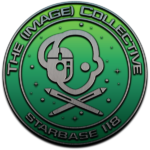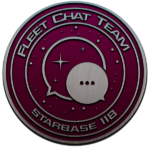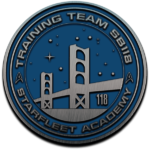By Nathan Baker
In this, the inaugural post of a, hopefully monthly column, we talk with one of Starbase 118’s well-known members. Dan Tubbe plays Commander Varaan, the Vulcan Commanding Officer of the USS ATLANTIS and a former Chief Engineer of the USS PALADIN. Nathan Baker: What are your earliest recollections of Star Trek and how did you get started in the UFOP?
Dan Tubbe: I’m too young to have watched Star Trek when it first aired. My earliest recollections of Trek were watching it on television when I was a child. At a certain point, I remember watching re-runs, and wondering where the alien helmsman was that I had remembered. It was years later that I realized that my “earliest recollections” had been of the animated series, but I had been young enough to not consciously conclude that it was a cartoon instead of “real” television. I’ve grown up a science fiction fan, with Star Trek, Star Wars, Buck Rogers, Battlestar Galactica and the like leading the way. More recently Stargate SG-1 has become a favorite. But it was the science in the science fiction that fascinated me. Storylines were storylines, and characters came and went, but the hows and the why’s of why things were the way they were and did what they did really took a hold of me. I’ve always longed for the future, and reveled in the “what could be.” During high school I was in to the table-top role playing games…being able to be someone else, if only for pretend. During university, when I was away from family and friends, but had access to a computer, I stumbled upon the concept of online role-playing. I even have my own Star Trek website, based in part on a ST tabletop RPG I’ve played. Eventually I found my way to the UFoP. A Star Trek PBEM was an easy choice, considering how comfortable I am in that universe. Mr. Spock was always a favorite character of mine because he was different (alien), and I’ve always thought that logic should be more predominant in this world than emotion, so playing a Vulcan seemed most logical to me. Ta da, Varaan was born.
NB: How long have you been with the UFOP?
DT: I believe that it will be four years this autumn, though it feels like longer.
NB: What made you want to start off as an Engineer?
DT: As I said before, I’ve always been more interested in the hows and the why’s of science fiction. Engineering is the “how”, and science is the “why.” These seemed to be my primary choices. I’ve always loved science, all the way through elementary school and high school they were my favorites. But I just didn’t think I’d be able to pull it off convincingly, especially with realistic results. And though a great deal of UFoP is good storylines, I’m a stickler for detail. If it’s not realistic, the storyline is just gobbledygook. Engineering, on the other hand, still held this mystique. If you want something done, you call an engineer. Build it, fix it, clean it out, or modify it so that it’s better than before. Engineers are involved in every facet of starship life.
NB: What was the most fun about being an Engineer?
DT: Honestly? The entire thing. All of it. Plotline moving along smoothly? Oops, there’s a fluctuation in the magnetic field of the antimatter containers. Better take the warp drive off line before the constrictors become fused and you have an out-of-control matter-antimatter imbalance on your hands. Who but an engineer could come up with something like that? Nothing to do? Try field striping the EPS manifold and cleaning up the ionic mass with a resonator. And there’s always something to do. Science mission? Ship still needs to run. Diplomatic mission? Ship still needs to run. Combat mission? Ship still needs to run. Engineers are always in demand, and easily inserted into any plot. It’s never boring.
NB: Most difficult?
DT: I’m sure most ships in the UFoP run into slow simming periods. Engineers can still contribute sims about ship maintenance, or maybe even jump start a sub-plot with a little power failure or the like. The hardest part about being an engineer, I found, was coming up with DIFFERENT scenarios time after time. You can’t always have the engines about to blow up. And interfering with the main systems too often really starts to annoy the other players.
NB: If you could give one piece of advice to those of us SIMming in Engineering, what would it be?
DT: Have fun! You didn’t see it too much in the original series, but it was more apparent in the movies, and especially in TNG’s episode “Relics.” Scotty had fun. Scotty loved his job. Geordi did too. DS9 didn’t really have an engineer (O’Brien technically wasn’t an engineer), but underneath all of B’Elanna’s Klingon bluster, she loved what she did to. They always say that you should find your line of work fun and rewarding, or you’re in the wrong line of work. If you don’t like engineering, transfer out to another department. If you’re going to stick around, you’d better like your job. And as I’ve said, there’s always something for an engineer to do.
NB: Do you have any interesting “miracle worker” stories you could share with us?
DT: During one mission, while I was the CEO on PALADIN, we were attempting to sneak into an area of space that was being monitored. PALADIN was a Prometheus-class vessel, the kind that could separate into three different ships. I figured out a way to hook up the spare warp reactor to a dedicated computer and a series of sensor arrays on the ship’s hull, to create a temporary makeshift cloaking device. The computer would use the passive sensors to take in whatever information on energy forms being directed at the hull, route them through the sensor arrays to the exact opposite side of the ship, and project them out the other side. Since even visible light is a form of energy, it would have made us virtually invisible…to the naked eye or active sensor sweeps. The computer and the sensors would be powered by the extra warp core, so it wouldn’t have reduced the ship’s regular systems at all. Of course, it was brought to my attention that building a cloaking device would violate the Federation’s side of the Treaty of Algeron, so my idea was dismissed. Politics, sheesh!
NB: Of all the Star Trek series, who would be your favorite engineer?
DT: Oh, this is a tough question. Each of them had different qualities I admire. Geordi was the idea man. He was a very creative engineer. B’Elanna was the ultimate “chief.” What she said was the law, and everyone jumped. Then, of course, there was the original “miracle worker,” Montgomery Scott. He embodied everything that it meant to be a Starfleet Engineer. But in all honesty, I think my favorite engineer is Reginald Barclay. I’ve always liked Dwight Schultz as an actor, and he brought a reality to Reg that made him “real.” His antics were funny, sure, but he also had hopes, fears, loves, faults. But he also had a mind that was very under appreciated by his peers. I’d have Reg on my staff, hands down.
NB: Now you’re a Commanding Officer. What advice would you give an officer, engineer or otherwise, who would like to be a CO one day?
DT: Before becoming a CO, first you have to get there. You’ve got to work your way up the ladder. There are four simple guidelines. 1 Respect. Not just other people, but their ideas, opinions, decisions, etc. It’s very important to listen, and reserve judgment. Nobody’s perfect and other people can pleasantly surprise you. 2-Receptive. There is no “I” in “Team.” The UFoP is a “collective” effort. Throw your ideas out there for other people, and feed off theirs. 3-Quality. A lot of people think quantity is the way to go. But who wants to read through a sim rife with spelling and grammar errors, and poorly worded ideas? Use the spell checkers built into most word processors, read over everything you write TWICE anyway because sometimes you’ve spelled the word correctly but it’s the wrong word, and make sure you’ve added detail AND MOVED THE PLOT ALONG before sending it. 4-Personalize. Don’t j
ust hit the reply button. Rewrite the sim from your character’s point of view. What you saw and heard and what you thought and felt. Once you’ve become the best possible simmer you can be, you’ll find you’ve moved up the ladder, and might already be a LtCmdr or Cmdr. Once you’re perched in a position to assume the mantle of command remember, none of these guidelines have changed. They’re more important than ever. Don’t think you can start slacking off now, because now you’re a role model for other officers in the fleet.
I’d like to thank Dan for his help with this first edition of “The Gremlin.” Stay tuned next month when we’ll take a deeper look at the life of one of Star Trek’s legends: James Doohan (AKA Scotty).

